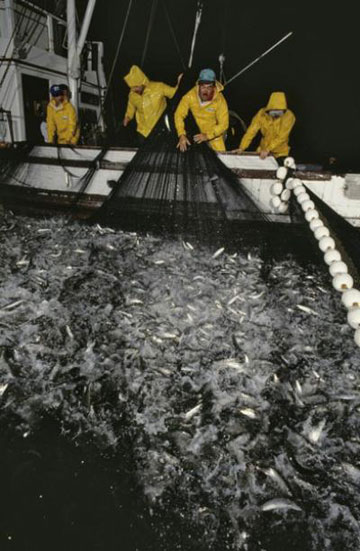It has long been known that overfishing has decimated some populations of tuna, shark, cod, as well as other big predatory fish; however two recent studies have pointed out that overfishing is also threatening small fish such as anchovies, sardines, mackerel, herring, menhaden, and krill. Although tiny, these species are vital to marine ecosystems since many species higher up on the food chain—from seabirds to marine mammals to big fish—wholly depend on them for survival.
“[Small fish] account for more than 30 per cent of global fisheries production for use directly as human food and indirectly in livestock feeds, and demand is rising,” explains Tony Smith of Australia’s Commonwealth Scientific and Industrial Research Organization (CSIRO)’s Wealth from Oceans Flagship, lead author of a recent paper on such ‘forage’ fish in Science.
Smith and his team looked at small fish in five regions, and found that even ‘sustainable’ targets were leaving small fish populations in trouble.
 Sardine fishermen haul in a net in Monterey Bay, California. Photo by Jonathan Blair / © Monterey Bay Aquarium. |
The team recommends halving small fish catches for these high-impact species, in addition to exploring no-take protected zones, especially in areas haunted by seabirds and marine mammals.
An second study in the Proceedings of the National Academy of Sciences (PNAS) has found that small fish are just as vulnerable to population crashes as more-publicized large fish.
“We were expecting to see a strong pattern with large, top predators showing the highest probability of collapse,” said co-author Malin Pinsky, a graduate student at Stanford. “We were really surprised to find that just isn’t the case.”
In fact the study found that major population declines were twice as likely with small versus large fish. However, small fish tend to bounce back quicker, recovering on average in five years, instead of the 15 or so years often required with larger species. Even with a shorter recovery time, though, the loss of small fish populations can have drastic impacts on marine biodiversity and abundance. Probably the most well-known example of a small fish collapse is anchovies off the coast of Peru, while currently, some researchers fear for the menhaden population in the Eastern Atlantic.
Such research bucks the advice given by some environmental groups that smaller fish are a ‘greener’ seafood choice.
“The important lesson is that all species of fishes can collapse once humans decide to eat or use them, from sardines to swordfish,” Pinsky added. “You hear the old adage, ‘Don’t sweat the small stuff,’ but for fisheries, we do have to care about the little guys. This really contrasts with what scientists, managers and the conservation community have often assumed up until now.”
Only around 10-20 percent of small fish catches are for direct humans consumption, the rest is ground up into livestock feed or used to fatten up fish on fish farms.
CITATIONS: Anthony D.M. Smith, Christopher J. Brown, Catherine M. Bulman, Elizabeth A. Fulton, Penny Johnson, Isaac C. Kaplan, Hector Lozano-Montes, Steven Mackinson, Martin Marzloff, Lynne J. Shannon, Yunne-Jai Shin, Jorge Tam. Impacts of Fishing Low–Trophic Level Species on Marine Ecosystems. Science. 2011. Science DOI: 10.1126/science.1209395.
Malin L. Pinsky, Olaf P. Jensen, Daniel Ricard, and Stephen R. Palumbi. Unexpected patterns of fisheries collapse in the world’s oceans. PNAS. 2011. 10.1073/pnas.1015313108.
Related articles
Fishing industry exceeds Atlantic bluefin quota by 141 percent
(10/18/2011) In 2010 the fishing industry exceeded its quota of eastern Atlantic bluefin tuna (Thunnus thynnus) by 141 percent, according to a new analysis by Pew Environment Group. The analysis depends on official data, thereby leaving out the massive black market on Atlantic bluefin tuna.
Poor in Madagascar see fish plundered for foreign consumption
(10/11/2011) A new study warns that overfishing could exacerbate poverty and political stability in one of the world’s poorest nations: Madagascar. According to the recent study by the University of British Columbia’s Sea Around Us Project and Malagasy NGO Blue Ventures, fish catches in the African island-nation from 1950 to 2008 are actually double the official numbers, with foreign wealthy nations currently taking half the haul.
Ocean prognosis: mass extinction

(06/20/2011) Multiple and converging human impacts on the world’s oceans are putting marine species at risk of a mass extinction not seen for millions of years, according to a panel of oceanic experts. The bleak assessment finds that the world’s oceans are in a significantly worse state than has been widely recognized, although past reports of this nature have hardly been uplifting. The panel, organized by the International Program on the State of the Ocean (IPSO), found that overfishing, pollution, and climate change are synergistically pummeling oceanic ecosystems in ways not seen during human history. Still, the scientists believe that there is time to turn things around if society recognizes the need to change.